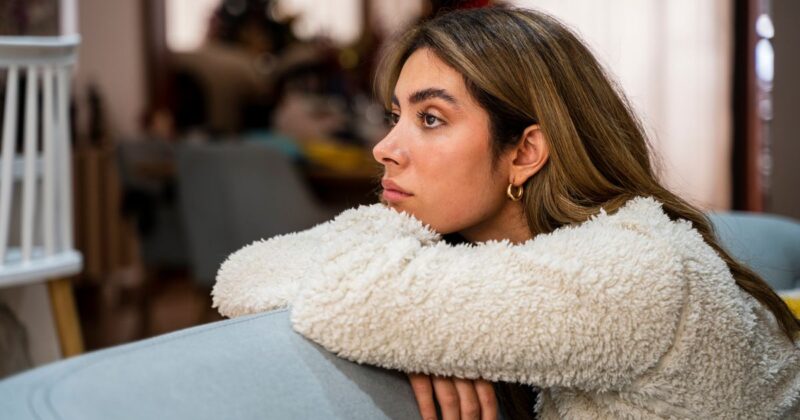What Therapists Say Harms Eldest Daughters’ Happiness Most

Are you too responsible for your own good? Are you highly critical of any mistake you make? Are you a perfectionist? You must be an oldest daughter.
All jokes aside, while there are certainly youngest children, middle children and only children who also possess these characteristics, these traits are most closely associated with eldest daughters ― a concept known as eldest daughter syndrome. A recent study about the topic found that firstborn daughters actually mature faster than other children because of the stress their moms experienced while pregnant.
That means there is truly something to the popular videos and memes about the struggles associated with being an eldest daughter, which include having to take care of grown-up tasks as a kid, being the one to organize family gatherings, and an inability to ask anyone for help.
It’ll come as no surprise to any eldest daughter that this isn’t easy, and it’s likely overwhelming to think about everything that you feel you need to get done. (Side note: You don’t.)
If you are looking to feel happier and more fulfilled, therapists say there is one thing that’s standing in the way of your happiness: over-responsibility.
According to Natalie Moore, a licensed marriage and family therapist in California, it’s common for eldest daughters to “feel overly responsible for their family of origin.”
They may feel responsible for younger siblings and even their parents, she added. They may also feel like they need to carry “the mental load,” or the invisible tasks required to keep a family afloat, such as getting birthday gifts for a nephew or making sure that your siblings wish your parents a happy anniversary.
“And then this can generalize to other relationships, feeling responsible in their own families in their homes and even feeling over-responsible at work,” stated Moore. “They have to always be the one to make sure that everything gets done and that everybody’s getting their work done on time.”
When you’re worried about all of the things you need to take care of, it can be hard to let loose and have fun.
For many eldest daughters, the responsibility is so much that they fill a parental role.
“I think one of the things for eldest daughters is that they often carry part of the parental burden,” said Danica Harris, a somatic therapist and coach based in Texas. This further speaks to the heightened responsibility that many feel.
“Sometimes that’s explicitly told to them, that they are responsible. But a lot of times it’s this implicit thing that happens in the family system where they will be responsible for some of the family stuff,” Harris noted.
This can especially be true when there are more than two kids in a family — the eldest daughter almost becomes a substitute parent, she said.
“If we’re talking about a heterosexual dynamic, so whereas dads maybe historically haven’t done as much caregiving or things like that around the house, it’s almost like the oldest daughter will be put into that role,” stated Harris. “And so what ends up happening is there’s a coalition between mom and the oldest daughter, and it’s almost like those two run the house, those two run the family.”
And that pressure to be responsible causes them to feel like they can’t make their parents worry.
“[The] oldest girl almost always hears, ‘You’re the one I never have to worry about,’ and it’s like they get put into that role where it’s, ‘Oh, I’m not allowed to cause my parents worry,’” Harris said.
This creates a huge sense of perfectionism, she said. “And it leads the eldest daughter [to be] trapped in this one role where it’s very rigid — I have to be perfect [and] there’s a ton of self criticism if they do anything wrong,” Harris explained. “And so because they’ve been parentified and adultified, then they have really high expectations.”
Vera Livchak via Getty Images
Societal pressures don’t help, either.
You’re likely aware that societal expectations for girls and women differ from those for boys and men, which only further adds to the over-responsibility that many oldest daughters feel, Moore said.
“We tend to expect girls and women to be more emotionally attuned and take on more of a caregiver role,” she said. “So eldest daughters have that double dose. Not only are they the oldest, and so they’re the most mature, [but also] there’s those expectations on them.”
This all puts an unfair burden on eldest daughters, which can diminish their happiness.
This can take away from the oldest daughter’s happiness because she feels more responsible and more grown-up than she should as a child, according to Harris.
“When we put adult responsibilities on children, they’re going to feel like they’re failing because they literally aren’t equipped to do the thing,” said Harris. “And if we feel like we’re failing as kids, we’re going to keep trying harder and harder and harder.”
And these tough feelings don’t just stop once an eldest daughter reaches adulthood.
“What you have to remember is that because these family roles and expectations were … developed at such a young age, we’re often not conscious of them,” Moore explained. “It’s something that eldest daughters just do without thinking.”
Many eldest daughters have a natural impulse to check in on people and make sure everyone is doing what they should, Moore added.
What’s more, eldest daughters often become the leader of a friend group, or the friend who everyone can count on — “but no one’s there for you,” Harris said.
And how would all of this not impact happiness?
“When anybody takes on more responsibility than is appropriate or they can handle, they’re going to be more apt to feel overwhelmed,” Moore said. “They can get burnt out. They can experience symptoms of anxiety or depression.”
Additionally, they may even feel like a failure or guilty when they can’t stay on top of everything, which further impacts joy, according to Moore.
Awareness is the first step in moving past these issues.
“The first step in any kind of behavior change is awareness — becoming aware of the role, understanding and reflecting on where it came from … noticing what about the role they like and don’t like,” Moore said.
There may be certain parts of the role that are harming your happiness, like the over-responsibility and the burnout. But there may be parts that you do enjoy, and that is OK. This could mean you’re willing to give your siblings advice but they need to call before coming over to get that feedback. Or, if you like arranging your mom’s birthday dinners, you can keep doing so but insist that your brother split the bill with you.
“A big part of this process is going to be setting boundaries and really rewriting your role to something that’s more aligned with your current values and what you’re wanting for yourself now,” Moore said.
Inner-child work and self-compassion are important, too.
“A lot of times, what I will have clients do is be curious about something from their childhood they missed out on because they were busy over-functioning,” Harris explained.
For example, if you wished that you could go to a swimming pool with your friends but always had to rush home to babysit your siblings, treat yourself with a visit to the pool.
“What did ‘little you’ want to do that you didn’t get to do?” Harris said. Once you decide on that, do some of those things. “Little-kid you had to be tougher than you should have ever had to be. So we want to comfort little-kid you now, so that you can feel like you can soften in the present,” she added
It’s also important to be gentle on yourself, which can include journaling, taking a responsibility off your plate so you can rest, or not punishing yourself when you make a mistake, Harris said. You should also find at least one person you can count on and go to when you’re having a bad day — and it shouldn’t be someone in your family system.
“I really think when we can soften to ourselves and be gentle with ourselves, every single thing in our life changes,” Harris added. “We’re going to have the same day no matter what. But if we can be kinder to ourselves through it, then at the end of the day we’re not as miserable, we’re not as tired, we’re less fatigued.”
For eldest daughters who thrive off rigidity and perfectionism, it can be hard to stop that cycle. “It’s like, ‘If I’m not hard on myself, then I’m not safe,’” Harris said. But that isn’t true, she stressed. What was true when you were a child is not true in adulthood, when you have more resources and autonomy.
“That’s a hard thing for the brain to buy into, but if you can soften to yourself a little bit, the body really likes that message,” Harris said. “The body really is thankful when we’re not so hard on ourselves.”








